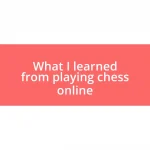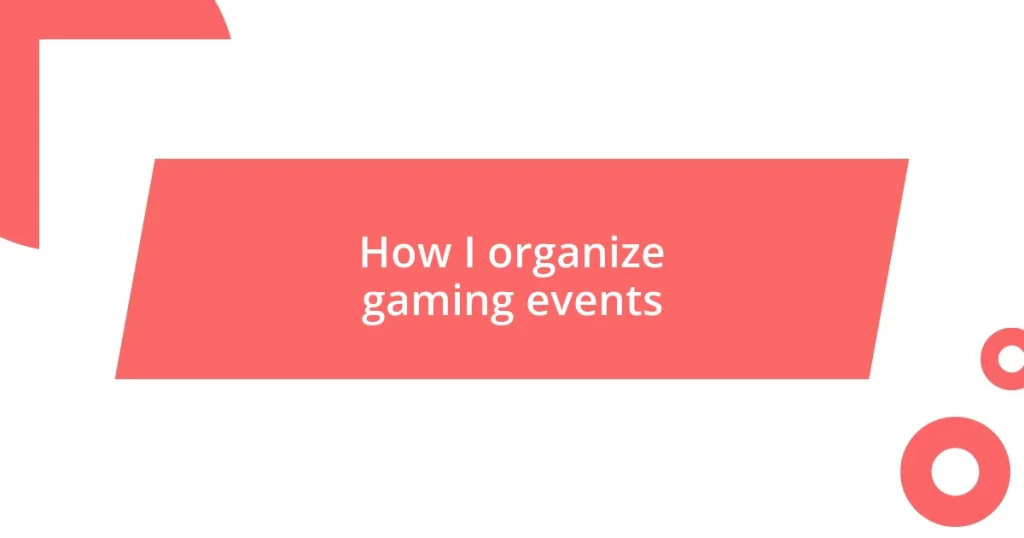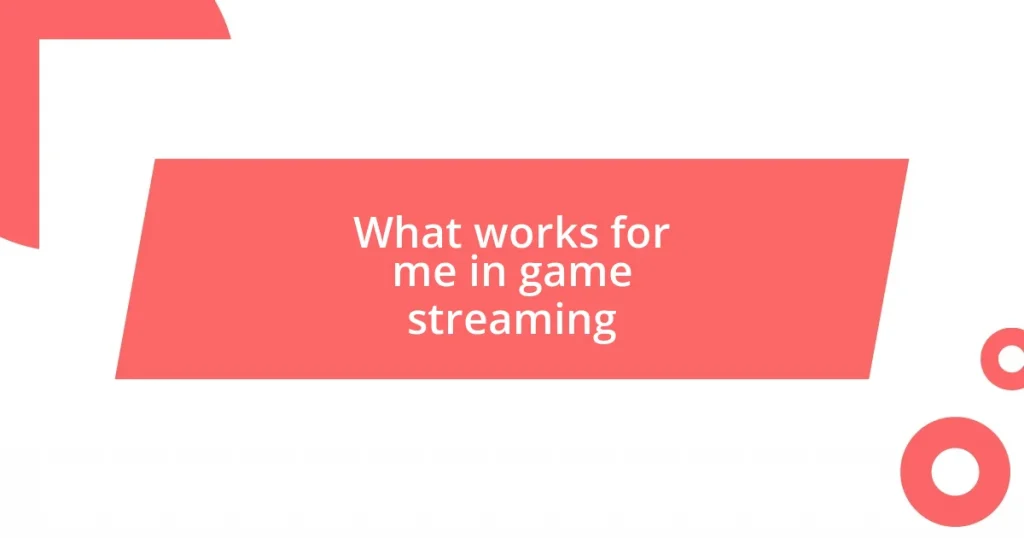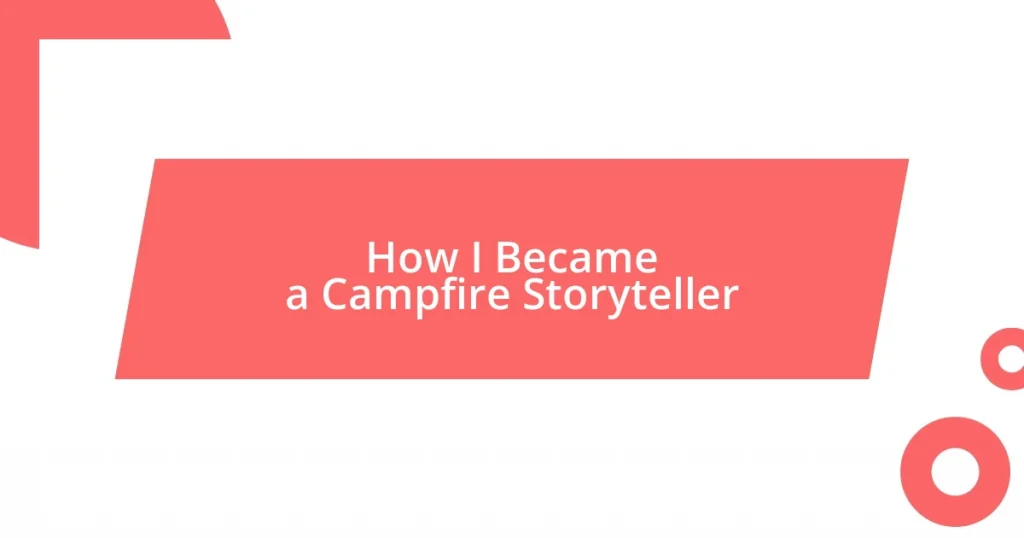Key takeaways:
- Gaming events foster community, creativity, and connection among participants, regardless of their skill levels.
- Effective planning, venue selection, and promotion are crucial for maximizing engagement and ensuring a successful event.
- Evaluating success through participant feedback, community engagement, and atmosphere can enhance future events and strengthen the gaming community.
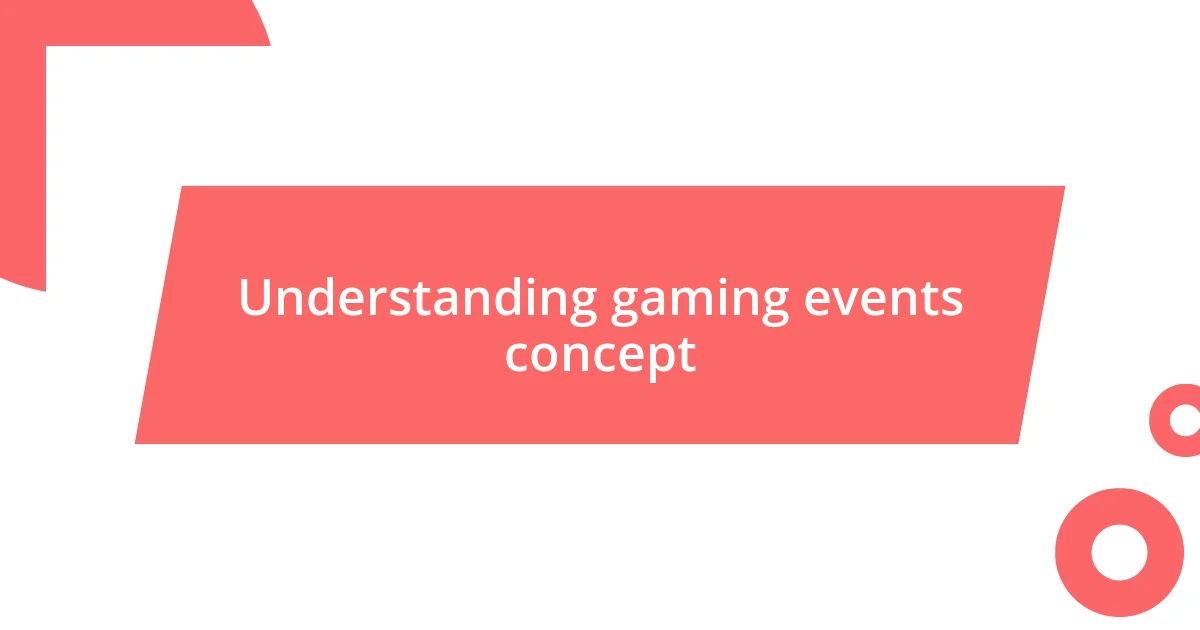
Understanding gaming events concept
Gaming events are more than just competitions; they’re vibrant gatherings that spark community, creativity, and camaraderie. I remember my first local tournament—walking in, I was instantly greeted by a shared passion that transcended individual skill levels. Have you ever felt that unique energy in a room full of gamers? It’s electric, and it sets the tone for the entire event.
At their core, gaming events can be a mix of casual meet-ups and high-stakes tournaments. When I attended a regional league last year, I realized how both amateur and pro players could learn from each other in a friendly setting. Isn’t it fascinating how some of the most profound relationships can blossom out of shared competition?
Moreover, structure plays a crucial role in the success of these gatherings. Each event is uniquely designed with formats, rules, and schedules that cater to diverse interests. I once participated in a game jam that required teams to create a game in just 48 hours. The pressure was intense, yet the thrill of innovation and teamwork made it an unforgettable experience. Do you see how these elements combine to create memorable moments for everyone involved?
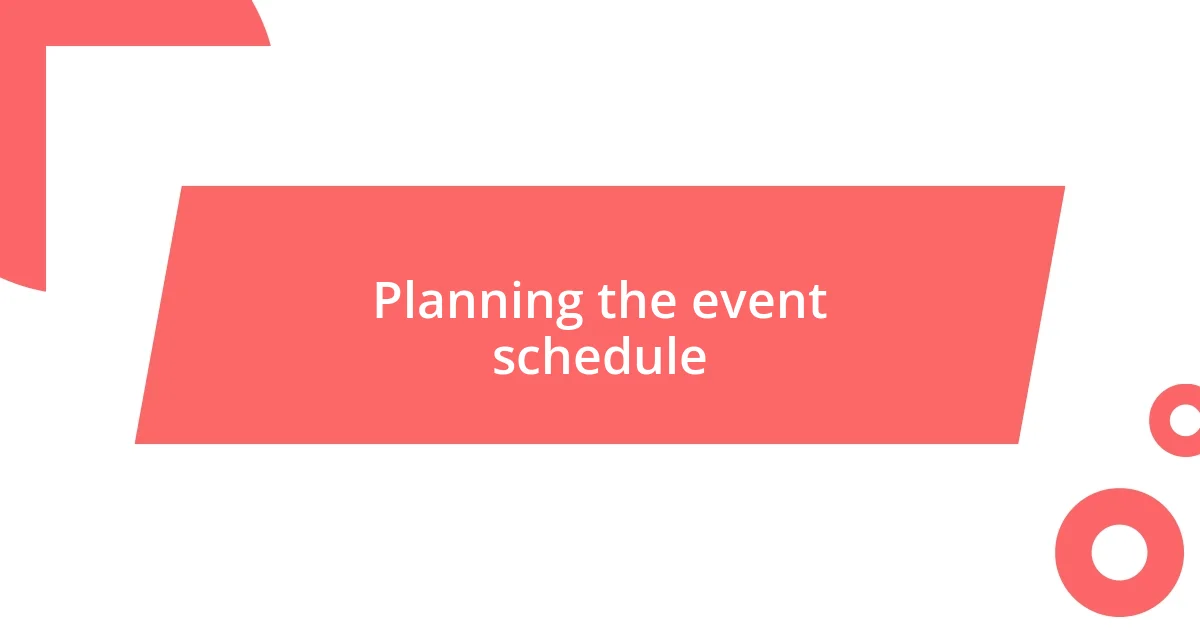
Planning the event schedule
Planning the event schedule is pivotal to maximizing the experience for everyone involved. In my experience, a well-structured timeline helps maintain the flow of activities and keeps participants engaged. For instance, during a gaming charity event I organized last year, I divided the day into rounds, allowing for breaks that encouraged socializing. This not only ensured participants were rested but also fostered connections that sparked excitement for the next match.
When creating the schedule, I always consider flexibility. No one wants to feel rushed or stuck in a long wait, right? I recall a gaming marathon where our team’s flexibility allowed us to extend a popular game segment. The change turned out to be a hit and deepened the event’s sense of community. A schedule providing breathing room can transform a standard event into an unforgettable experience.
It’s also essential to communicate the schedule clearly to all participants. I make it a point to display timelines prominently, both digitally and on-site, ensuring everyone is in the loop. My team once faced a challenge where attendees were unsure of the next match timings. Learning from that, I implemented a real-time update system that ended up being a game-changer. What methods do you think would help with schedule clarity?
| Event Type | Ideal Duration |
|---|---|
| Tournaments | 3-6 hours |
| Casual Meet-ups | 2-4 hours |
| Workshops | 1-2 hours |
| Game Jams | 24-48 hours |
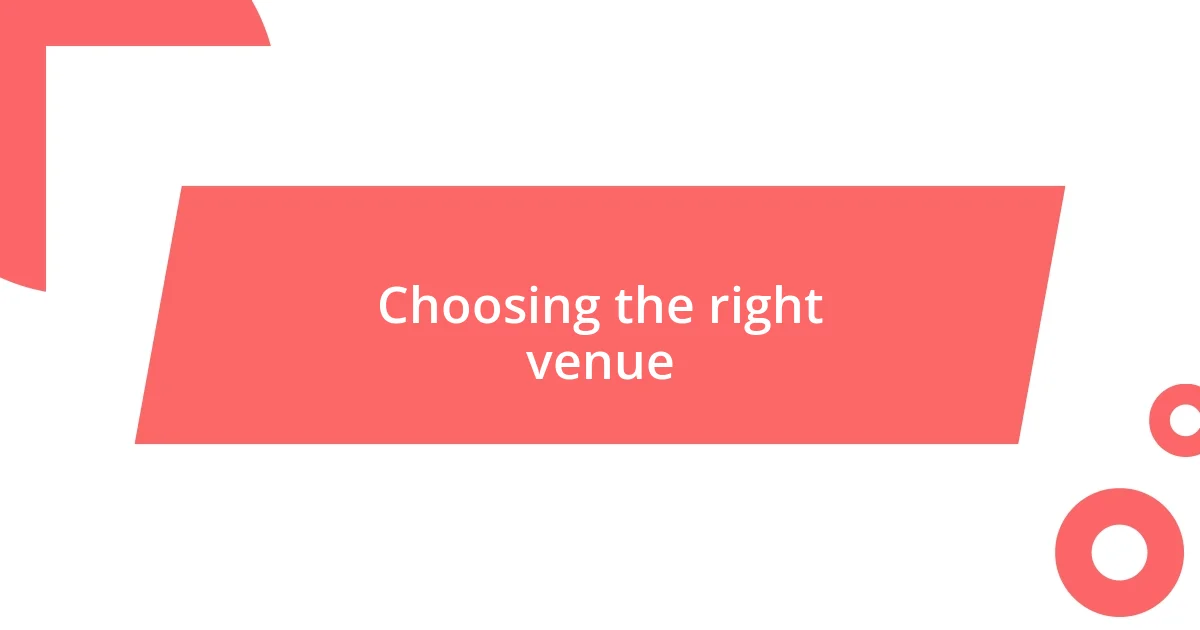
Choosing the right venue
Choosing the right venue can make or break a gaming event. I’ve realized that the atmosphere directly influences participant engagement. For example, at a small arcade venue I chose once, the walls echoed with laughter and friendly banter, creating a warm and inviting space. But when I organized an event in a high-end conference center, despite the shiny amenities, the sterile environment felt disconnected, making it harder for attendees to bond. It’s all about finding that sweet spot between accessibility and ambiance.
Here are some key factors to consider when selecting a venue:
- Capacity: Ensure the venue can comfortably accommodate all participants.
- Accessibility: Consider locations that are easy to reach, with ample parking or public transport options.
- Facilities: Look for venues with necessary amenities—Wi-Fi, power outlets, and food options can be crucial.
- Ambiance: Choose a space that aligns with the vibe of your event—cozy, energetic, or professional.
- Affordability: Balance your budget while ensuring quality; some hidden gems offer value without breaking the bank.
Reflecting on past events, I learned that the right venue can transform the entire experience. One time, I secured an outdoor space that allowed for both gaming and relaxation areas, leading to spontaneous breakout matches and roaring laughter—truly memorable moments that solidified friendships among gamers. Tell me, have you ever found yourself inspired by a venue choice?
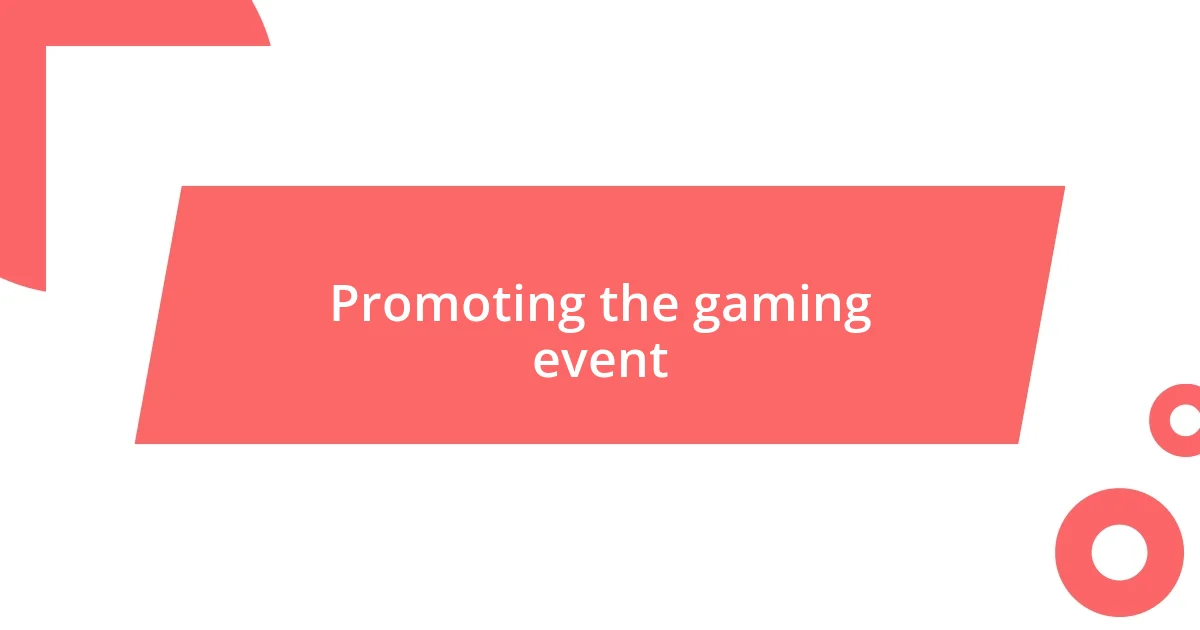
Promoting the gaming event
Promoting your gaming event effectively can be the difference between a packed house and an empty room. I always rely on social media platforms to reach a broader audience. One time, I used Instagram stories to showcase behind-the-scenes preparation for an event, which not only built anticipation but also created a connection with potential attendees. Have you ever considered how much excitement a sneak peek can generate?
Another strategy I find invaluable is collaborating with local gaming influencers or streamers. Their established audiences trust their recommendations, which can give your event a major boost. During a past tournament, partnering with a popular streamer led to a noticeable uptick in registrations. It’s like having a personal cheerleader—who wouldn’t want that for their event?
I also believe that clear and vibrant visuals play a crucial role in promotion. When I designed eye-catching posters and flyers for my last gaming weekend, I noticed how they drew attention wherever they were placed. This reminds me—how often do you think about the impact of your promotional materials? They can truly convey the energy and vibe of the event, making it irresistible to potential participants.
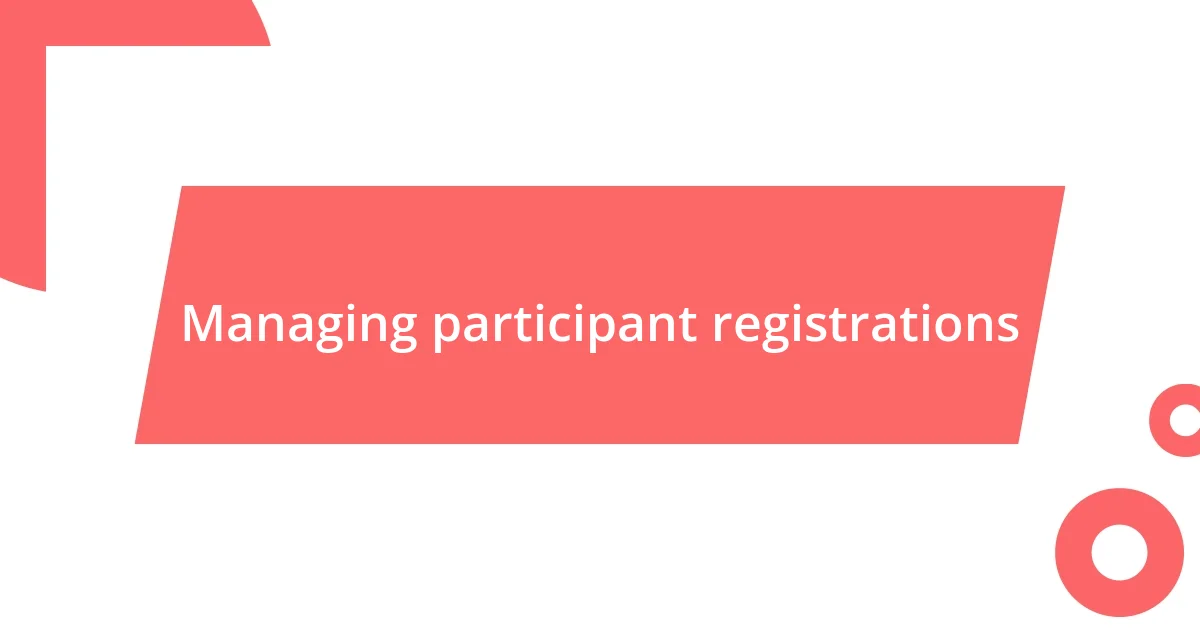
Managing participant registrations
Managing participant registrations is a vital step that can shape the entire gaming event experience. I’ve found that using an online registration platform simplifies everything, making it easier for participants to sign up while also providing me with necessary data. When I hosted a competitive gaming night, I used a platform that allowed for quick and seamless registrations, which saved me a lot of last-minute headaches.
To enhance engagement, I send out friendly reminders leading up to the event. One time, I crafted a playful email with gaming memes and countdowns, which not only reminded participants to complete their registrations but also got them excited about the event. It’s amazing how a touch of humor can spark enthusiasm—have you tried incorporating fun elements in your communications?
Lastly, I always keep an eye on the registration numbers. A couple of weeks prior to an event, I noticed a slight drop in sign-ups. To address this, I reached out to past attendees with a personalized message inviting them back. The effect was immediate. Not only did they appreciate the outreach, but it also triggered a wave of interest among their friends. Isn’t it interesting how a personal touch can rekindle excitement?
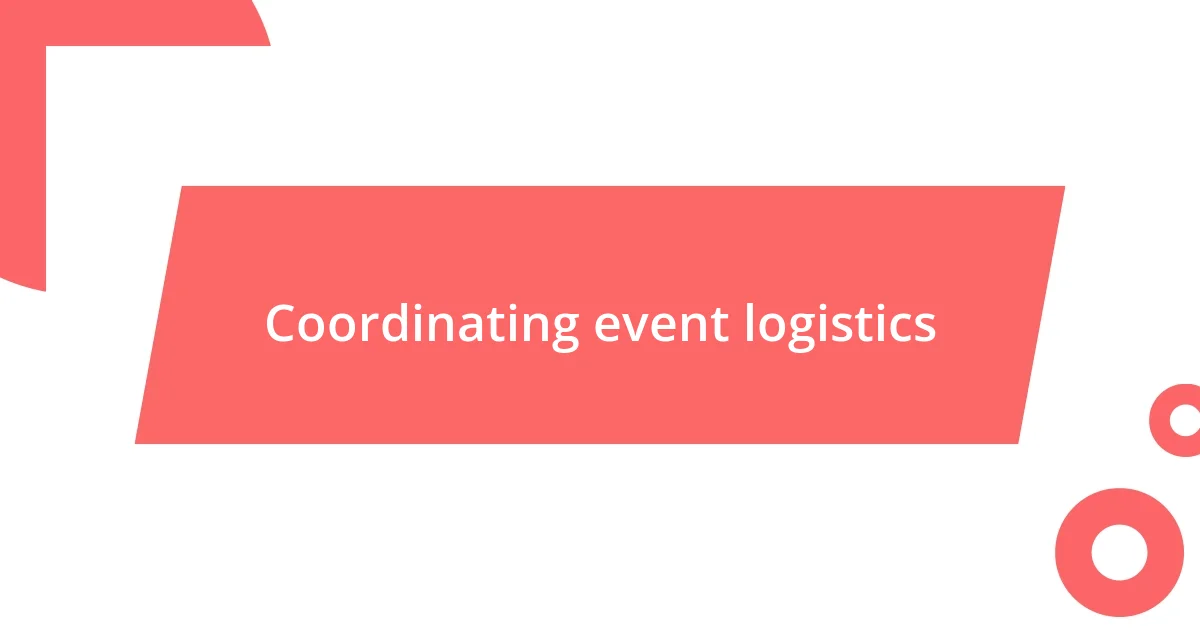
Coordinating event logistics
Coordinating event logistics can feel a bit like juggling, especially when trying to keep everything aligned. I always start by mapping out a timeline leading up to the event. For instance, during one of my larger gaming tournaments, I created a detailed schedule that included delivery times for equipment and deadlines for vendor confirmations. Trust me, having a clear timeline helped me avoid chaos and ensured everything was ready on the big day.
One aspect I’ve learned to prioritize is venue setup. I vividly remember my first experience with this; I underestimated how much time it would take to arrange gaming stations and test equipment. When the day came, everything felt rushed. Now, I make it a point to arrive early to set up and do testing, which alleviates last-minute stress. Have you ever considered how much smoother an event can flow with adequate prep time?
Finally, I can’t stress enough the importance of communication among the event team. I often set up a group chat to keep everyone informed, especially during the actual event. One time, during a live-streamed tournament, we faced a technical glitch, but because we were in constant contact, we managed to troubleshoot quickly. It reinforced my belief that teamwork and clear communication can transform potential setbacks into mere bumps in the road.
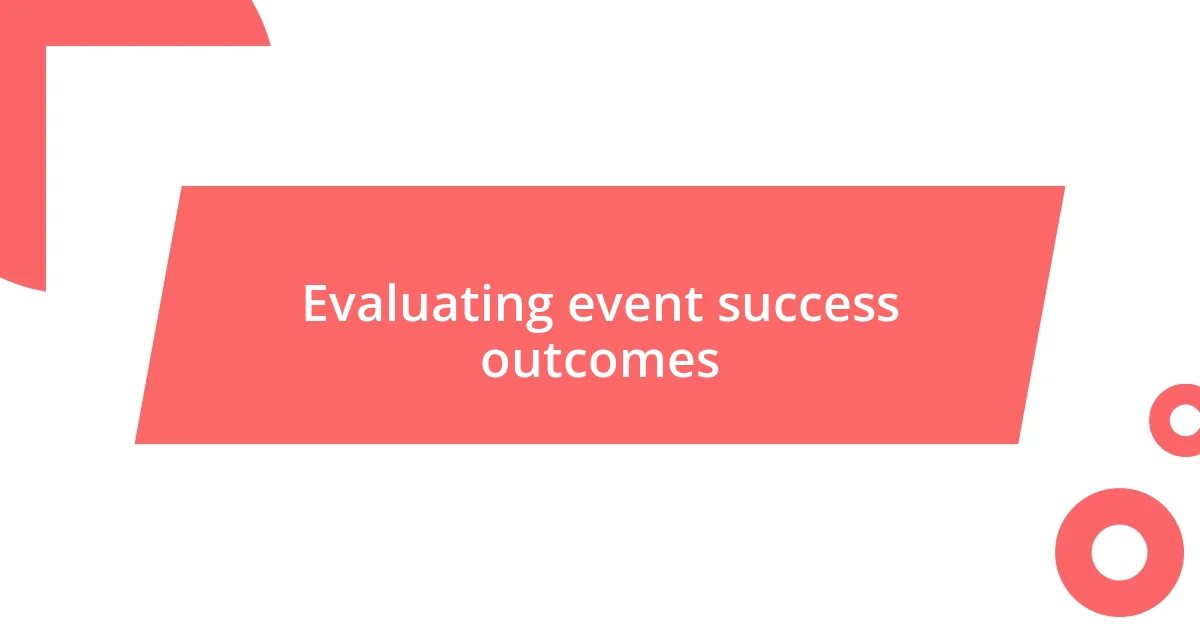
Evaluating event success outcomes
To evaluate the success outcomes of my gaming events, I always refer back to specific metrics. For instance, after my last tournament, I analyzed participant feedback and retention rates. Did you know that a simple post-event survey can unveil insights you’d never expect? I was amazed to discover that 80% of attendees expressed interest in returning for future events, which reinforced my commitment to continuous improvement.
Community engagement also plays a huge role in assessing an event’s success. I vividly recall one tournament where I encouraged participants to share their gameplay experiences on social media. The flood of posts and interactions that followed created a buzz that extended well beyond the event. It really struck me how passionate gamers are about their experiences—have you ever thought about how social media can amplify the excitement?
Lastly, I pay close attention to the atmosphere and overall participant satisfaction during the event. There was a particular occasion where players were laughing, cheering, and rallying each other on. In that moment, I realized the event was a success—not just because of the gameplay, but because of the camaraderie it fostered. How often do we measure success beyond scores and stats? It’s the connections and memories that truly define a great gaming experience.



